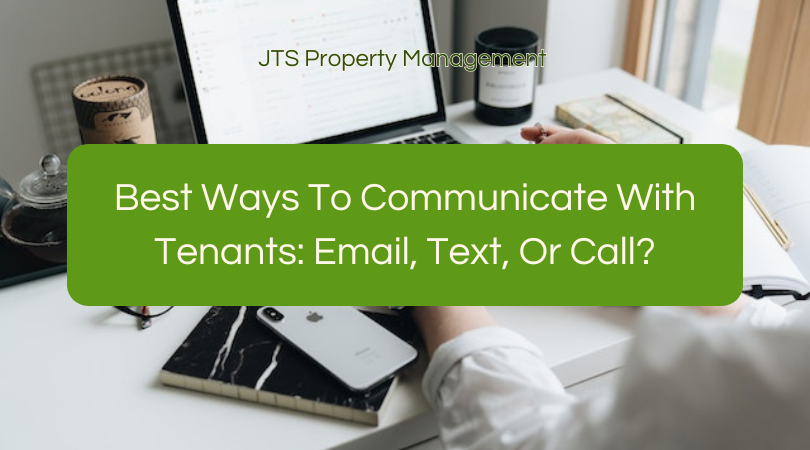Effective communication with tenants is a crucial aspect of property management. It can either make or break your chances of succeeding as a landlord. When communicating with tenants, your goal should be to be as accurate, clear, concise, and courteous as possible.
Now, as a landlord, you have several options at your disposal, including text messages, emails, and phone calls. Each method offers unique advantages and can be suited to different situations. Choosing the right communication channel can enhance your relationship with tenants and streamline your landlord responsibilities.
Here are proven tips on how to communicate with tenants for stress-free management.
Calling Tenants
Phone calls remain a vital tool for landlords to connect with tenants. Ideally, phone calls work well when it comes to emergencies, friendly reminders, and complex discussions.
You should give your tenants a call for:
Emergencies: This channel can help you get the attention of the tenant as quickly as possible when compared to email or text.
Quick, courteous reminders: These can help prevent late payments or potential lease violations.
Clarification or when seeking additional info: This can help you create a dialogue that can yield details for much clarity.
When calling tenants, maintain professionalism. Begin the conversation by introducing yourself and stating your reason for calling immediately.

Avoid overfamiliarity or vagueness, as this can lead to misunderstandings. If you reach voicemail, leave a detailed message explaining why you had to make the call. This approach increases the likelihood of a return call and preserves a positive landlord-tenant relationship. Add a personal touch to your calls with a friendly tone and appropriate greetings.
Stick to business hours for non-emergency calls, respecting your tenants' privacy and following FCC guidelines.
Legal Aspects of Phone Conversations
Phone conversations can have legal implications in certain situations. In some states, verbal agreements made during a call might be considered legally binding. It's crucial to familiarize yourself with your state's regulations and what constitutes a legal contract.
To protect yourself and maintain clarity, follow up phone conversations with written documentation. Record call notes in your property management software and send a follow-up email to your tenant summarizing the discussion. This practice can ensure both parties have a clear record of the conversation and any agreements made.
Remember that voicemail recordings could be admissible in court under specific circumstances. Maintain the same level of professionalism in your voicemail messages as you would in a direct conversation.
Emailing Tenants
Just like phone calls, emails can be a powerful method of communicating with tenants if used in the right way. Use it to share visual content like infographics and pictures, which can convey information more effectively than text alone. Set up automated reminders for rent payments, invoices, and other financial matters to save time and ensure timely communication.
Email can allow you to quickly notify the tenant of important updates. Including, on things like renovations, maintenance, or new policies. It also provides a dated record of communications, which can be invaluable for documentation purposes.

Draft every email with purpose and high-level professionalism. Avoid sending the tenant emails that are random, incomplete, or incoherent. Include your contact details in the electronic mail.
Legal Status of Email Communications
Email notifications generally qualify as legal written documentation. This can be crucial for maintaining records of tenant interactions and agreements. However, be aware that some states may have specific requirements for certain types of notices, such as move-out instructions or lease violations.
It's advisable to consult with a real estate expert like a property management company to understand the exact legal standing of email communications in your area. This can help you determine when email is sufficient and when other forms of notification might be necessary.
Texting Tenants
Just like phone calls and emails, texting your renters can boost communication effectiveness if used in the right way.
Begin by obtaining their consent and documenting it in the lease agreement. Explain what types of messages they can expect to receive and how often. Set clear guidelines for what tenants can text you about. Many property management software options offer texting features, allowing you to schedule individual or group messages automatically.
Legal Status of Text Notifications
Text messages may be recognized as legal electronic communication in some areas. However, for crucial matters like lease changes or rent increases, provide hard copies to ensure better protection.
Use texting primarily for simple reminders and follow-ups to emails or written notices.
Abide by Your State’s Privacy Laws
When communicating with a tenant, you must ensure you do so within legal parameters. Specifically, you must ensure you respect the tenant’s privacy.
When communicating with the tenant over a phone call, email, or text, you’ll want to avoid doing any of the following things.
Constantly contacting the tenant, even for minor issues.
Disrupting the tenant’s sleep by making late-night or early-morning calls.
Asking the tenant about their personal life, such as their finances or relationships.
Conclusion
Choose your communication method based on purpose, urgency, documentation needs, and tenant preferences. Younger generations often prefer texts for reminders and payments. Some people still favor phone calls over emails and texts. Ask your tenants about their preferred communication method for best results.
For expert help in handling all your property management matters, look no further than JTS Property Management. You can rely on our team of knowledgeable and experienced property managers for quality full-service property management services. Get in touch to learn more!


